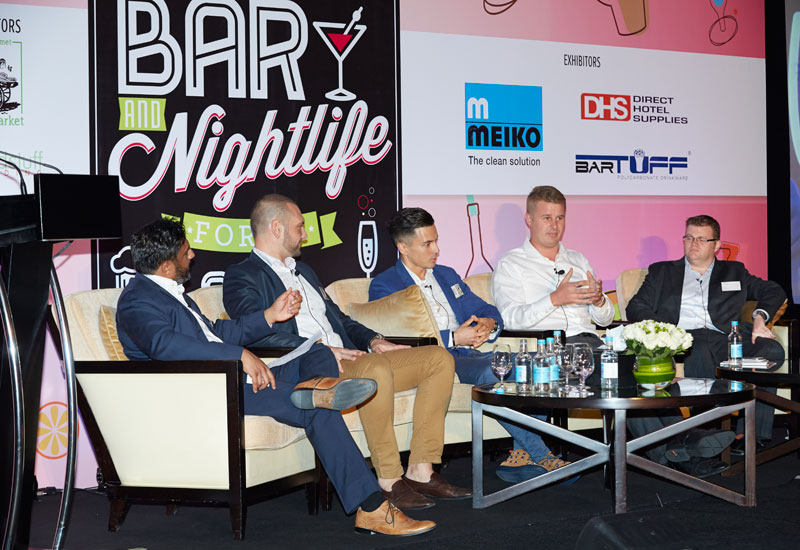Supplier Issues
Panellists at the event also debated whether the industry needed more beverage suppliers, with the speakers unanimously concurring that a third or even fourth player would make the existing suppliers more competitive in their pricing as well as choice of brands on offer.
Gillgren said: “Hospitality has grown so much [here]; maybe we could look at a third or fourth player to get the full variety in all our bars, restaurants and nightclubs. It’s like a monopoly — you can get one brand from one supplier.”

| Advertisement |
Paul Bradley, assistant manager — beverage, Mint Leaf of London agreed with Gillgren and said it’s a dual concern, where if there were more suppliers, would venues still be in a position to get more brands? He also added that there was an issue with external controls on what bars can and cannot stock.
Maadad asked whether the market was ready for a variety of beverages, and Azzabi said it was. He stated: “Some of the brands which are well marketed around the world are also known here and ready to enter the market. It’s also about giving the product a lifestyle spin. Dubai is very much a lifestyle city. We are continually looking at the brands behind our bars to ensure they are offering the best brands but also in response to our guests and customer base.”
Diversity in nightlife
It’s not all gloom and doom for the industry though, and according to several speakers at the event, the industry is clearly finding its own way to compete while simultaneously growing the offering through new concepts.
Despite lack of support from suppliers, the nightlife industry has to strive to offer the market a variety of options to choose from, and with strict alcohol licensing laws based on locations, most licensed outlets have little option than to be located in close proximity.
Jumeirah group director of beverage Ian McEvoy said: “We always want to give customers as much choice as possible. How you go about offering that choice is the difficult thing. Licensing laws are difficult and very restrictive.
Most licensed premises are based in or around hotels. So how do you operate a neighbourhood bar if you are located in a hotel or part of a property? How do you offer something different, when to pay for all the fees, you have to charge a higher price?”
Some venues have tried to use their space in various ways over the course of the day. Case in point is Zero Gravity, which offers a breakfast on weekends, followed by an afternoon brunch, before turning into a nightclub after sunset.
Zero Gravity general manager Peter Skudutis explained the concept, saying: “We are linked to Jumeirah Group and we have to operate as a standalone while still offering the Jumeirah service. We’ve had to take our business in a very different direction based on the target market, the offering.
“We have had to strategically separate ourselves from the normal ways of hotels to make sure that we can give people a different offering; we have to be able to offer something to the masses.”
With increasing diversity in the market, clubs are also turning to promoters to fill their venues and market their bars or nightlife concepts to a selective audience.
During a workshop on the effectiveness of promoters versus in-house marketing, Think ME managing director Gred Dufton revealed how the company was working with Zero Gravity to promote the space.
“They didn’t want to go down the promoter route but use a promotions company that has expertise and then we work exclusively with them on that.”
“The venue is important, it’s very difficult to get people to a rubbish venue. If the venue is quality like Mahiki then you stand a pretty good chance of pulling people into it.
“Dubai is really a tourist hub and that’s what we fight for. We have to be vigilant and hunting people. Tourism is a big help but they also need to be informed about us. Word spreads very quickly so if you have a bad reputation, you are doomed,” he added.
Story Rooftop Lounge general manager Tomas Vindasius also believes the industry is more willing to try new things, saying: “The underground movement has been a very high risk movement in the past. This is the first year I’ve seen in Dubai, where the underground scene is now attracting the masses.
And what was niche in the past is now very common. That shows the development of Dubai, shows the development of the industry. We are becoming more like other cities in the world that have such a strong nightlife industry.”
How the nightlife industry addresses the key challenges going forward will determine its performance in the international markets.
There are still gaps that certainly need to be filled, but as Naim Maddad pointed out during his session: “What is happening in the market is amazing on a lot of fronts. There have been a lot of market corrections, from an economy perspective, which has supported the industry. With 2020 coming online as well there is a lot of interest in the region.”
Article continues on next page ...






web.jpg)



 Search our database of more than 2,700 industry companies
Search our database of more than 2,700 industry companies









